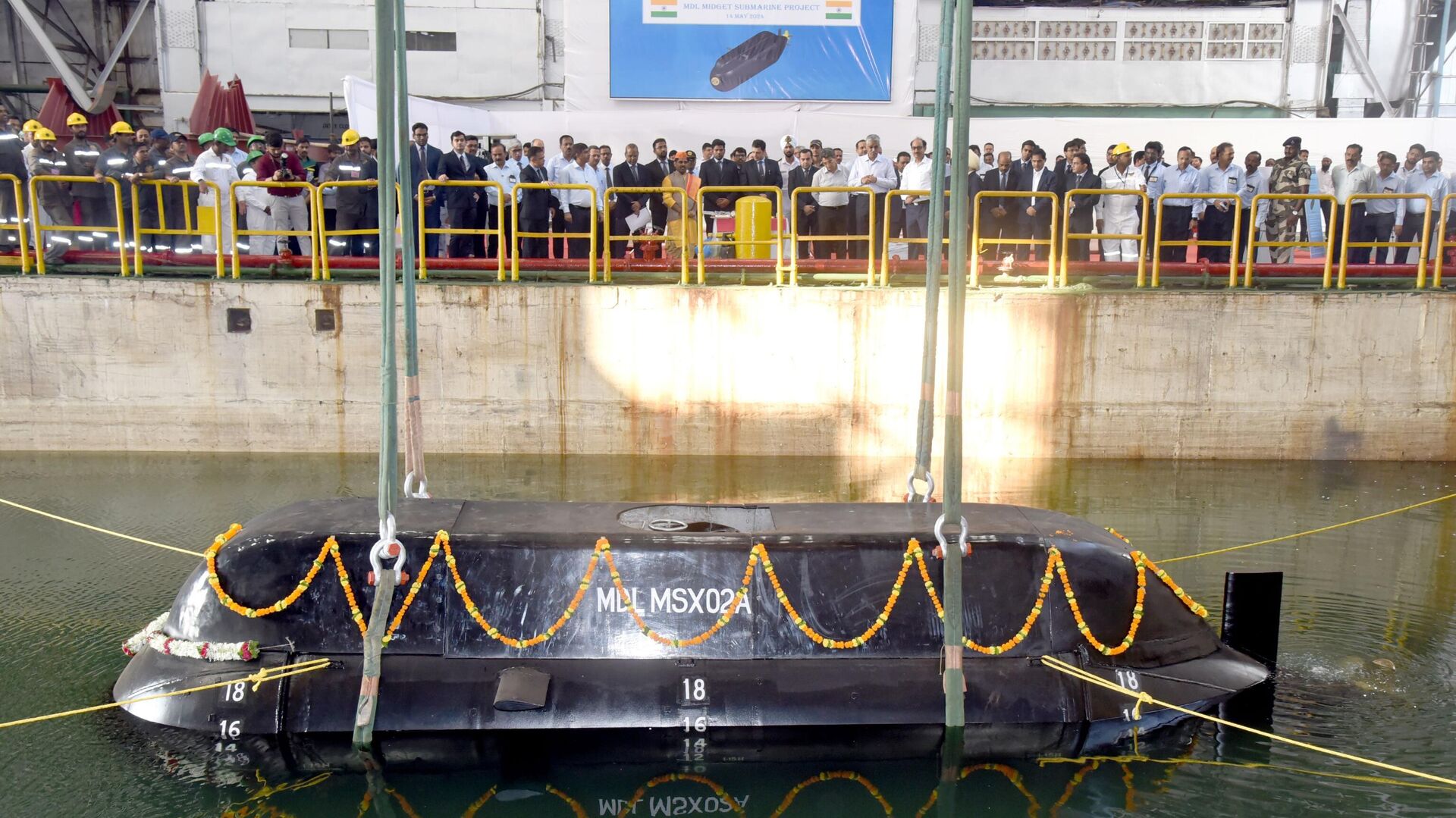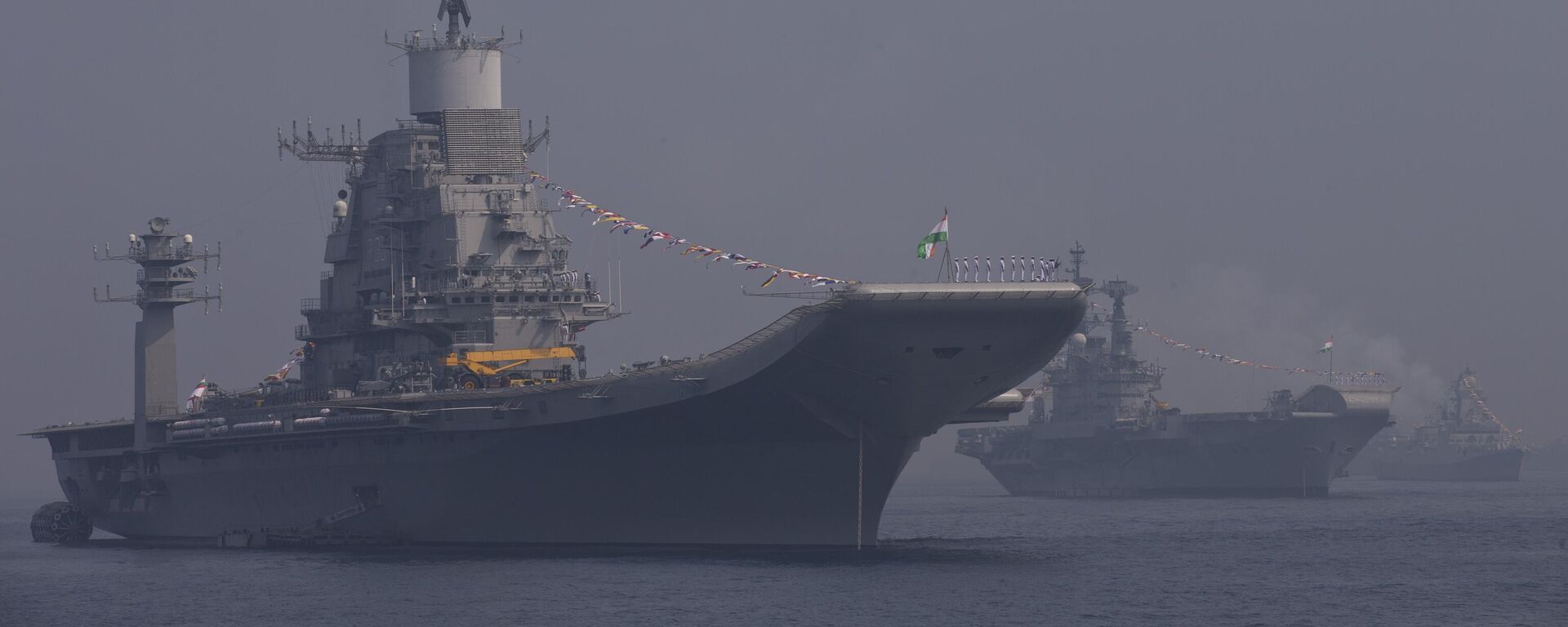https://sputniknews.in/20240516/how-indias-midget-submarine-would-bring-a-paradigm-shift-in-its-underwater-operations-7388029.html
How India's Midget Submarine Would Bring a Paradigm Shift in Its Underwater Operations
How India's Midget Submarine Would Bring a Paradigm Shift in Its Underwater Operations
Sputnik India
India on Tuesday launched a prototype of its next-generation midget submarine, codenamed Arowana, which is expected to give a major fillip to the Indian Navy's underwater operations.
2024-05-16T20:36+0530
2024-05-16T20:36+0530
2024-05-16T20:36+0530
india
indian navy
anti-submarine warfare
submarine
warship
south asia
military equipment
defense sector
make in india
self-reliant india
https://cdn1.img.sputniknews.in/img/07e8/05/0e/7366651_0:161:3071:1888_1920x0_80_0_0_3c51083781578a35160348f913aa1f48.jpg
India on Tuesday launched a prototype of its next-generation midget submarine, codenamed Arowana, which is expected to give a major fillip to the Indian Navy's underwater operations.The unveiling of the midget submarine's prototype is being recognized as a moment of great magnitude, considering the wide scale of engineering prowess used to pull off the construction of Arowana, mainly with indigenous content.Unlike conventional submarines, Arowana, which is being designed and manufactured by the state-run shipyard, the Mazagon Dock Shipbuilders Limited (MDL), is being developed keeping in mind the operational requirements of the South Asian nation's blue water force.The midget submarine is primarily being developed to conduct covert missions in ocean waters.Indian Navy veteran Commodore (retired) Seshadri Vasan described the development as a "milestone event" in the chequered history of the country's maritime force.Difference Between a Conventional and Midget SubmarineHe explained that unlike a conventional submarine, which generally weighs 3000-4000 tonnes and carries a crew of approximately 30-60 people, a midget submarine is much smaller in size and capacity. Normally, its weight would not exceed 500 tonnes and it would only be manned by less than five people besides having a small unit of specialized commandos that would conduct the clandestine mission inside the adversary's territorial waters.In addition to that, the midget submarines will be better equipped in terms of sensors so that they are able to navigate in narrow straits and waters and also wherever depth is a constraint, the retired Indian Navy officer pointed out.If one compares a conventional submarine with a midget submarine, the former is prone to detection, especially when it has to come out of the water and reach the surface to charge its batteries. As the primary mode of propulsion is the battery, these submarines have to be charged at regular intervals.The other important aspect related to the development of midget submarines in India is that not only MDL is developing it but Larsen & Toubro (L&T) is in the fray as well.While the MDL's midget sub is a little smaller in size, L&T's would have a displacement of about 300-400 tonnes.Another dimension of the midget submarine is that India would be able to launch autonomous underwater vehicles from them, which would allow its naval forces to map the enemy's naval installations, harbors, etc without much risk to the human crew, the defense expert observed
https://sputniknews.in/20240430/what-navys-plan-to-achieve-100-percent-self-reliance-in-warship-making-means-for-india-7255955.html
india
south asia
Sputnik India
feedback.hindi@sputniknews.com
+74956456601
MIA „Rossiya Segodnya“
2024
Pawan Atri
https://cdn1.img.sputniknews.in/img/07e6/0c/13/139630_147:0:831:684_100x100_80_0_0_8fa2b25903e7787fe6a2698552c167df.png
Pawan Atri
https://cdn1.img.sputniknews.in/img/07e6/0c/13/139630_147:0:831:684_100x100_80_0_0_8fa2b25903e7787fe6a2698552c167df.png
News
en_IN
Sputnik India
feedback.hindi@sputniknews.com
+74956456601
MIA „Rossiya Segodnya“
Sputnik India
feedback.hindi@sputniknews.com
+74956456601
MIA „Rossiya Segodnya“
Pawan Atri
https://cdn1.img.sputniknews.in/img/07e6/0c/13/139630_147:0:831:684_100x100_80_0_0_8fa2b25903e7787fe6a2698552c167df.png
midget submarine prototype, arowana, maritime security, defense prowess, india's defence secretary, giridhar armane, indian shipyard, mazagon dock shipbuilders limited, indigenous conventional submarine, maritime defense technology, defence secretary, solar electric hybrid boat, warship technology, self-reliant, self-reliance, private sector,
midget submarine prototype, arowana, maritime security, defense prowess, india's defence secretary, giridhar armane, indian shipyard, mazagon dock shipbuilders limited, indigenous conventional submarine, maritime defense technology, defence secretary, solar electric hybrid boat, warship technology, self-reliant, self-reliance, private sector,
How India's Midget Submarine Would Bring a Paradigm Shift in Its Underwater Operations
The Indian Navy is rapidly augmenting its fleet of naval vessels, with newer additions being made regularly. The induction of a midget submarine could be on the horizon soon.
India on Tuesday launched a prototype of its next-generation midget submarine, codenamed Arowana, which is expected to give a major fillip to the Indian Navy's underwater operations.
The unveiling of the midget submarine's prototype is being recognized as a moment of great magnitude, considering the wide scale of engineering prowess used to pull
off the construction of Arowana, mainly with indigenous content.
Unlike conventional submarines, Arowana, which is being designed and manufactured by the state-run shipyard, the Mazagon Dock Shipbuilders Limited (MDL), is being developed keeping in mind the operational requirements of the South Asian nation's blue water force.
The midget submarine is primarily being developed to conduct covert missions in ocean waters.
"Midget Submarine is being developed as a proof of concept. The team is parallelly working on the development of design of full-scale conventional submarine by 2028," the Ministry of Defense said in a statement.
Indian Navy veteran Commodore (retired) Seshadri Vasan described the development as a "milestone event" in the chequered history of the country's maritime force.
Difference Between a Conventional and Midget Submarine
He explained that unlike a conventional submarine, which generally weighs 3000-4000 tonnes and carries a crew of approximately 30-60 people, a midget submarine
is much smaller in size and capacity.
Normally, its weight would not exceed 500 tonnes and it would only be manned by less than five people besides having a small unit of specialized commandos that would conduct the clandestine mission inside the adversary's territorial waters.
"The special force in India's case is the MARCOS, which are the Marine Commandos. They will be launched as and when required depending on the situation, both in peacetime and also during a period of hostility," Vasan told Sputnik India on Thursday.
In addition to that, the midget submarines will be better equipped in terms of sensors so that they are able to navigate in narrow straits and waters and also wherever depth is a constraint, the retired Indian Navy officer pointed out.
If one compares a conventional submarine with a midget submarine, the former is prone to detection, especially when it has to come out of the water and reach the surface to charge its batteries. As the primary mode of propulsion is the battery, these submarines have
to be charged at regular intervals.
The other important aspect related to the development of midget submarines in India is that not only MDL is developing it but Larsen & Toubro (L&T) is in the fray as well.
While the MDL's midget sub is a little smaller in size, L&T's would have a displacement of about 300-400 tonnes.
Another dimension of the midget submarine is that India would be able to launch autonomous underwater vehicles from them, which would allow its naval forces to map the enemy's naval installations, harbors, etc without much risk to the human crew, the defense expert observed
"Nonetheless, both autonomous and manned vehicles are necessary because, at times, specialized human forces like the MARCOS are required to conduct covert missions to outwit its rivals," Vasan concluded.



